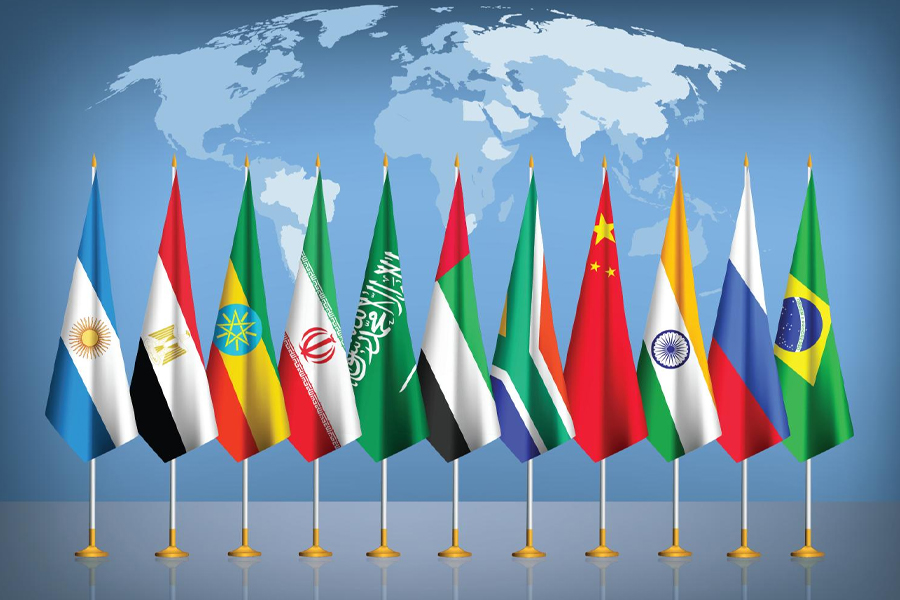
Radar | Sep 29,2024
Aug 26 , 2023
By Jim O’Neill
When I coined the BRIC acronym back in 2001, my primary point was that global governance would need to adjust to incorporate the world's largest emerging economies. Not only did Brazil, Russia, India, and China top the list of that cohort; they also were collectively responsible for governing close to half of the world's population. It stood to reason that they should be represented accordingly.
Over the past two decades, some have misread my initial paper as a kind of investment thesis, while others have interpreted it as an endorsement of the BRICS (South Africa was added in 2010) as a political grouping. But I never intended any such thing. On the contrary, ever since the Brazilian and Russian foreign ministers proposed the idea of creating a formal BRIC political grouping in 2009, I have questioned the organisation's purpose, beyond serving as a symbolic gesture.
Now that the BRICS has announced that it will add six more countries – Argentina, Egypt, Ethiopia, Iran, Saudi Arabia, and the United Arab Emirates – I pose the question again. The decision, after all, does not appear to have been decided on any clear objective, much less economic, criteria.
Why, for example, was Indonesia not asked? Why Argentina and not Mexico, or Ethiopia and not Nigeria?
Clearly, the BRICS' symbolic power will grow. The group has been able to tap into the broader Global South's suspicion that post-World War II global governance organisations are too Western. It has occasionally been able to present itself as the voice of the emerging and developing world – a category that, of course, excludes the United States and other advanced economies. Insofar as it has reminded everyone that the structure of international institutions does not reflect the global economic shifts over the past three decades, it has succeeded.
It is true that in terms of purchasing power parity, the BRICS are slightly larger than the G7. But, because their currencies trade at prices far below their PPP-implied levels, the group remains significantly smaller than its advanced-economy counterpart when measured in current nominal US dollars.
It is also true that China has firmly established itself as the world's second-largest economy. In nominal terms, its GDP is more than three times larger than Japan and Germany, and around 75pc the size of the US. Meanwhile, India has been growing fast and seeks to become the third-largest economy by the end of this decade. But none of the other BRICS has performed anywhere near as well as these two. Brazil and Russia account for around the same share of global GDP as they did in 2001, and South Africa is not even the largest economy in Africa (Nigeria has surpassed it).
Of course, some G7 members are in the same boat. Italy and Japan have registered hardly any growth for many years, and the United Kingdom, too, has been struggling. Just as China dominates the BRICS by dint of being twice the size of all the others combined, so is the US now bigger than the rest of the G7 combined. America and China dominate their respective groups even more than they did in the past. These dynamics suggest that neither the G7 nor the BRICS (expanded or otherwise) makes much sense for tackling today's global challenges. Neither can do much without the direct, equal involvement of the other.
What the world needs is a resurrected G20, which already includes all the same key players, plus others. It remains the best forum for addressing global issues such as economic growth, international trade, climate change, and pandemic prevention. Though it now faces significant challenges, it still can reclaim the spirit of 2008-10, when it coordinated the international response to the global financial crisis. At some point, the US and China will have to overcome their differences and allow the G20 to return to its central position.
As for the BRICS, the group could be more effective, on the margins, if key members were earnest about pursuing shared goals. But China and India rarely agree on anything, and given their current bilateral relationship, neither is likely to be enthusiastic about the other gaining more influence in key global institutions (unless they are equally balanced). That said, if China and India could resolve their border disputes and develop a closer constructive relationship, both countries would benefit, as would world trade, global economic growth, and the BRICS' effectiveness.
China and India could cooperate in many areas, and in ways that would influence the other BRICS and many others throughout the Global South.
One big issue is the dominance of the US Dollar. It is not especially healthy for the world to depend on the Dollar and, as a corollary, on the US Federal Reserve's monetary policy. The introduction of the euro could have diminished the Dollar's dominance if eurozone member states had agreed to allow their financial instruments to be liquid and large enough to appeal to the rest of the world. Similarly, if any of the BRICS – especially China and India – undertook significant financial reforms to achieve that goal, their currencies would almost certainly become more widely used.
But if they continue to limit themselves to complaining about the Dollar and musing in the abstract about a shared BRICS currency, they are unlikely to achieve much.
This article is provided by Project Syndicate (PS).
PUBLISHED ON
Aug 26,2023 [ VOL
24 , NO
1217]


Radar | Sep 29,2024

Life Matters | Dec 04,2020

My Opinion | Aug 26,2023

My Opinion | Aug 03,2024

Radar | Jan 09,2024

Agenda | May 28,2022

Radar | Jun 07,2020

Sunday with Eden | Sep 07,2019

Viewpoints | Oct 20,2024

Verbatim | Jan 01,2022

My Opinion | 131546 Views | Aug 14,2021

My Opinion | 127902 Views | Aug 21,2021

My Opinion | 125878 Views | Sep 10,2021

My Opinion | 123508 Views | Aug 07,2021

Dec 22 , 2024 . By TIZITA SHEWAFERAW
Charged with transforming colossal state-owned enterprises into modern and competitiv...

Aug 18 , 2024 . By AKSAH ITALO
Although predictable Yonas Zerihun's job in the ride-hailing service is not immune to...

Jul 28 , 2024 . By TIZITA SHEWAFERAW
Unhabitual, perhaps too many, Samuel Gebreyohannes, 38, used to occasionally enjoy a couple of beers at breakfast. However, he recently swit...

Jul 13 , 2024 . By AKSAH ITALO
Investors who rely on tractors, trucks, and field vehicles for commuting, transporting commodities, and f...

Jun 28 , 2025
Meseret Damtie, the assertive auditor general, has never been shy about naming names...

Jun 21 , 2025
A well-worn adage says, “Budget is not destiny, but it is direction.” Examining t...

Jun 14 , 2025
Yet again, the Horn of Africa is bracing for trouble. A region already frayed by wars...

Jun 7 , 2025
Few promises shine brighter in Addis Abeba than the pledge of a roof for every family...

Jun 29 , 2025
Addis Abeba's first rains have coincided with a sweeping rise in private school tuition, prompting the city's education...

Jun 29 , 2025 . By BEZAWIT HULUAGER
Central Bank Governor Mamo Mihretu claimed a bold reconfiguration of monetary policy...

Jun 29 , 2025 . By BEZAWIT HULUAGER
The federal government is betting on a sweeping overhaul of the driver licensing regi...

Jun 29 , 2025 . By NAHOM AYELE
Gadaa Bank has listed 1.2 million shares on the Ethiopian Securities Exchange (ESX),...